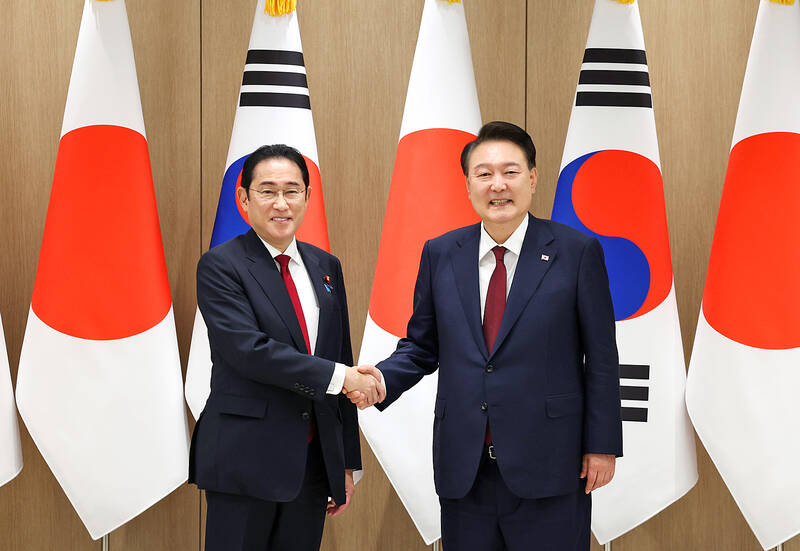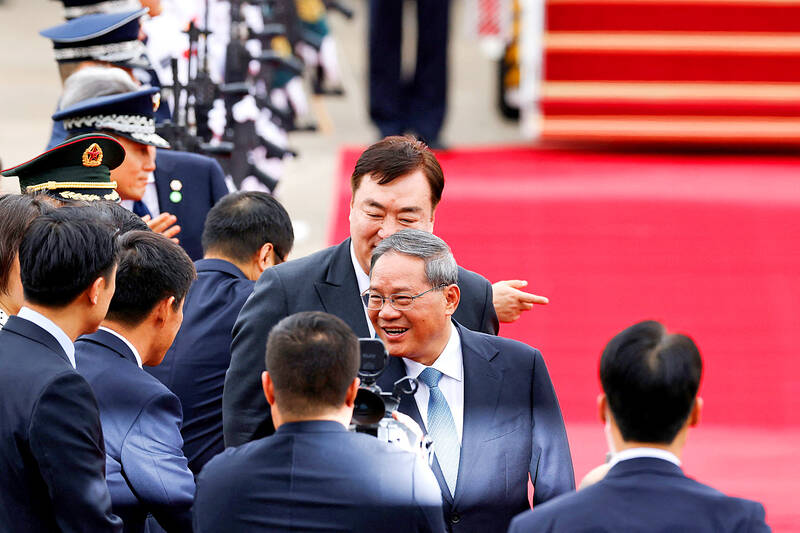South Korean and Chinese leaders yesterday agreed to start diplomatic and security dialogue and push a trade deal, when they met in Seoul ahead of a key trilateral summit with Japan.
There are low expectations of any major announcements or breakthroughs at the trilateral meeting today, but the leaders have expressed hopes it could help revitalize three-way diplomacy and ease regional tensions.
South Korean President Yoon Suk-yeol met Chinese Premier Li Qiang (李強), who is making his first visit to South Korea since taking office in March last year, and they agreed to establish a diplomatic and security dialogue and resume talks on a free-trade deal.

Photo: EPA-EFE
“China and South Korea face significant common challenges of the international affairs,” Yoon said, pointing to the wars in Ukraine and Gaza as sources of increased uncertainty in the global economy.
Yet with decades of solid ties behind them, he hoped the two countries “will continue to strengthen our cooperation amid today’s complex global crisis,” Yoon said.
Li said Beijing wanted to work with Seoul to become “a good neighbor worthy of trust on a mutual basis.”

Photo: Reuters
The two leaders discussed North Korea, which has contravened successive rounds of UN sanctions over its banned weapons programs, with Yoon telling Li he hoped China could be “a bastion of peace as a permanent member of the UN Security Council.”
Yoon, Li and Japanese Prime Minister Fumio Kishida are to hold a trilateral meeting today, the first such encounter since 2019, partly due to the COVID-19 pandemic, but also to long-strained ties between South Korea and Japan.
Yoon, who took office in 2022, has sought to bury the historical hatchet with former colonial power Japan in the face of rising threats from nuclear-armed North Korea.
Yoon also met Kishida yesterday, and said the two countries’ trust and exchanges had “dramatically increased over the past year,” pointing to booming tourism, with millions of Koreans flocking to visit Japan, and vice versa.
He said he hoped to see a “historic turning point” and a further deepening of ties next year to mark 60 years since a post-war deal normalized relations between Tokyo and Seoul.
Kishida said it was crucial that Seoul and Tokyo moved to step up cooperation “to better prepare for global issues while maintaining a free and open Indo-Pacific.”
Experts have said that due to the three countries’ starkly divergent positions on key issues including Pyongyang’s nuclear threats and growing ties with Russia, it would be hard for them to reach a consensus.
However, South Korea and Japan, which are key regional security allies of China’s archrival the US, are looking to improve trade and ease tensions with Beijing, experts say.

STILL COMMITTED: The US opposes any forced change to the ‘status quo’ in the Strait, but also does not seek conflict, US Secretary of State Marco Rubio said US President Donald Trump’s administration released US$5.3 billion in previously frozen foreign aid, including US$870 million in security exemptions for programs in Taiwan, a list of exemptions reviewed by Reuters showed. Trump ordered a 90-day pause on foreign aid shortly after taking office on Jan. 20, halting funding for everything from programs that fight starvation and deadly diseases to providing shelters for millions of displaced people across the globe. US Secretary of State Marco Rubio, who has said that all foreign assistance must align with Trump’s “America First” priorities, issued waivers late last month on military aid to Israel and Egypt, the

France’s nuclear-powered aircraft carrier and accompanying warships were in the Philippines yesterday after holding combat drills with Philippine forces in the disputed South China Sea in a show of firepower that would likely antagonize China. The Charles de Gaulle on Friday docked at Subic Bay, a former US naval base northwest of Manila, for a break after more than two months of deployment in the Indo-Pacific region. The French carrier engaged with security allies for contingency readiness and to promote regional security, including with Philippine forces, navy ships and fighter jets. They held anti-submarine warfare drills and aerial combat training on Friday in

COMBAT READINESS: The military is reviewing weaponry, personnel resources, and mobilization and recovery forces to adjust defense strategies, the defense minister said The military has released a photograph of Minister of National Defense Wellington Koo (顧立雄) appearing to sit beside a US general during the annual Han Kuang military exercises on Friday last week in a historic first. In the photo, Koo, who was presiding over the drills with high-level officers, appears to be sitting next to US Marine Corps Major General Jay Bargeron, the director of strategic planning and policy of the US Indo-Pacific Command, although only Bargeron’s name tag is visible in the seat as “J5 Maj General.” It is the first time the military has released a photo of an active

CHANGE OF MIND: The Chinese crew at first showed a willingness to cooperate, but later regretted that when the ship arrived at the port and refused to enter Togolese Republic-registered Chinese freighter Hong Tai (宏泰號) and its crew have been detained on suspicion of deliberately damaging a submarine cable connecting Taiwan proper and Penghu County, the Coast Guard Administration said in a statement yesterday. The case would be subject to a “national security-level investigation” by the Tainan District Prosecutors’ Office, it added. The administration said that it had been monitoring the ship since 7:10pm on Saturday when it appeared to be loitering in waters about 6 nautical miles (11km) northwest of Tainan’s Chiang Chun Fishing Port, adding that the ship’s location was about 0.5 nautical miles north of the No.